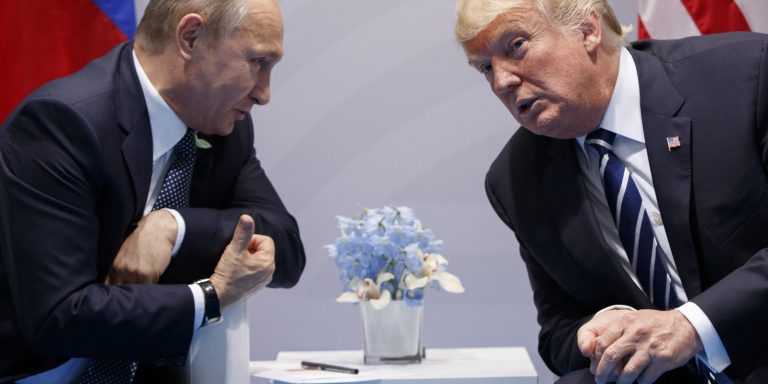INTELBRIEF
April 3, 2018
IntelBrief: What Presidents Trump and Putin Could Discuss

- On April 2, the White House confirmed that President Trump had mentioned meeting his Russian counterpart during a March phone conversation.
- From Crimea to Syria to disinformation campaigns, Russian policies and actions are at direct odds with those of the U.S. and other Western countries.
- Putin has fanned the flames of paranoia and victimhood; claims of Russo-phobia follow every credible accusation against Russia.
- Any meeting between President Trump and President Putin would be fraught, as the issues between the West and Russia can no longer be ignored or minimized.
.
On April 2, the White House confirmed a Kremlin statement that United States President Donald Trump had discussed, or at least mentioned, a possible summit between himself and Russian President Vladimir Putin. Press Secretary Sarah Sanders, in response to questions about the Kremlin statement, said Presidents Trump and Putin ‘had discussed a bilateral meeting in the “not-too-distant future” at a number of potential venues, including the White House.’ Putin aide Yury Ushakov told reporters on April 2 that President Trump ‘proposed holding a meeting at the White House in Washington D.C.
Both Washington and Moscow stressed that there are no concrete details as to timing or venue, or even if the proposed summit would happen. Were such a meeting to occur in the near future, it would take place during some of the worst tensions between the two countries since the 1980s. While President Trump has consistently expressed a public desire to be on good terms with President Putin and has avoided all criticism of him despite his zeal for public condemnation, the U.S. and Russia are at odds across the geopolitical spectrum.
President Putin has consolidated power in Russia in a way not seen since the depths of the Cold War, and much of his support—hard to accurately measure given the restrictions of free press and speech in Russia—is built on his nationalistic ‘Make Russia Great Again’ rhetoric and policies. Imagery and messaging from Russia’s costly victory in World War Two are everywhere in Russia, helping to tie Putin to that ‘Great Cause.’ With this backdrop, to oppose Putin is to oppose a strong Russia, a political maneuver similar to one Trump uses in the U.S. Putin has fanned the flames of paranoia and victimhood; claims of Russo-phobia follow every credible accusation against Russia, from the downing of MH17 to the attempted murder of former Russian intelligence officer Sergei Skripal and his daughter Yulia. President Trump has worked a similar message in the U.S., with the U.S. being cast as the perpetual sucker, taken advantage of by international organizations like the United Nations and in trade agreements like NAFTA.
While any summit between the two leaders would be focused on partnership and common ground, that potential is shrinking fast. Terrorism used to be the one fail-safe discussion for the U.S. and countries with whom there are few shared goals. That is no longer the case with Russia, evidenced by the conflict in Syria. Russia is heavily supporting the Assad regime and accuses Washington of aiding rebels that are merely terrorists by another name. Washington accuses Moscow of being complicit in Assad’s war crimes and of destroying the possibility of peace negotiations with moderate rebel forces. Russia and the U.S. have not come to direct conflict in Syria, but the margin of error for misunderstandings is far too thin for comfort.
The Russian seizure of Crimea—and the illegal annexation that followed—remains a constant source of tension between Russia and the West; likewise, Russia’s support of the ongoing war in eastern Ukraine shows no sign of ending. Russia has been credibly and repeatedly named as the culprit in electoral and social disinformation campaigns, from Scandinavia to the United Kingdom to the U.S. Yet, its blatant active measures to sow discontent and encourage division have been relatively cost-free for Moscow. The reaction to the brazen attempted murder of Sergei Skripal in Salisbury, England, is noteworthy, but it is uncertain if the public and unified response by a significant number of countries will transform into a more lasting and effective counter to Russia. Any meeting between President Trump and President Putin would be fraught, however, as the issues between the West and Russia can no longer be ignored or minimized.
.
For tailored research and analysis, please contact: info@thesoufancenter.org
[video width="960" height="540" mp4="https://thesoufancenter.org/wp-content/uploads/2018/04/Final-Edit-1-164.mp4" poster="https://thesoufancenter.org/wp-content/uploads/2018/04/AP_17188818500208-1-e1522747822233.jpg"][/video]